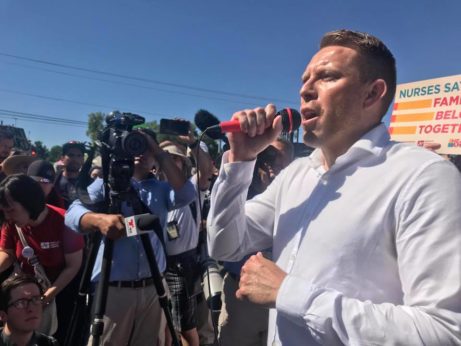
EL PASO, Texas—“Do they have water? Do they have air conditioning? It gets to be 110 degrees to 115 degrees in El Paso,” says Idali Cooper.
And the physical condition of the kids, separated from their parents at the U.S.-Mexican border and carted in buses to what Cooper describes as a large tent surrounded by a six-foot chain link fence, are just two of the worries she has.
The kids, torn away from their parents by Trump administration orders, were bused to the big tent in this border metropolis. That led Cooper, dozens of other nurses marshaled by National Nurses United, its Texas affiliate, other NNU members from around the country and more than 1,000 people overall to march on the camp on June 19.
The group demanded the kids be reunited with their parents – and they all be treated humanely.
The El Paso camp is one of many that Trump’s Immigration and Customs Enforcement agency and the Border Patrol set up to take the kids, who are split from their parents as soon as the families reach the U.S.-Mexico border, seeking asylum from wars, vicious gangs and general chaos in Central America.

The marchers, marshaled by the Border Network for Human Rights, brought a detailed list of demands for an end to the destruction of the families and mistreatment of people seeking asylum in the U.S.
“We are standing up for something that matters,” Cooper said in a telephone interview. As for the kids, “It was like a tent city and you couldn’t find the entrance.” But the physical ills the kids suffer from when forcibly yanked from their parents are not the only ones, says Cooper, a pediatric nurse.
“I’m very worried,” she said. Besides seeing ICE and the Border Patrol confining the kids in the tents, Cooper reported “people cannot pick them (the kids) up and comfort them.”
“Being comforted by your parents is very important for your psychological well-being,” says Cooper. “They’ll have trust issues. They’ll have anger issues,” she says of the kids being held behind that chain link fence.
And for Cooper, a U.S. citizen whose own parents immigrated from Mexico, “this is personal.”
“This is the humane thing to do. It doesn’t matter where you were born. You should be treated like a human being, not an animal.”
That’s also a key point in the letter the Border Network sent to top Trump administration officials, demanding an end to an inhumane policy that produced a nationwide uproar. Cooper knows the politics, too, but she puts it in terms of the kids she’s worried about.
“He (Trump) shouldn’t use these kids as bargaining chips to coerce the Democrats into giving him what he wants” on immigration issues in general and the fate of the kids and their parents in particular, she says. “He’s like a spoiled child.”
“Children should not be separated from their parents,” she declares emphatically.
The NNU nurses are doing more than just march. The union activated its Registered Nurse Response Network, usually used to help victims of natural disasters, to send 600 volunteer nurses to the ICE detention camps in El Paso, Fort Bliss and elsewhere.
“The conditions that can exist in these areas — including summer temperatures in excess of 108 degrees — will place the children at extreme physical and mental health risk,” the union said.
Despite the uproar and the conditions, Cooper’s not surprised at Trump’s attitude. “In Texas, we face racism like that” all the time, she says, more so in rural areas such as Lubbock, where she went to college, than in El Paso.
As for what people who are not close to the border can do, Cooper has a straightforward message. Observing the people who were on the march, of all races, creeds, ages and colors, she declared: “Call your representative, call your senator. Let them – including Trump –know this is not OK.
“And support people in November” – the election – “who don’t support these practices.”
Otherwise, Cooper learned from a fellow marcher, an older woman, they could lead to something far far worse.
“’This is how it started back in Germany,’ the woman said. ‘They started by taking away the children to the concentration camps.’”
“So what’s the next step?” Cooper asks. “This could be our future.”










